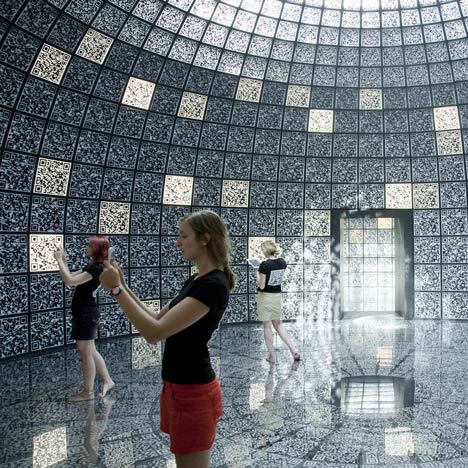As the Venice Architecture Biennale 2012 draws to a close, we take a look back at the five exhibitions and pavilions that were most popular with Dezeen readers, as well as the biggest news stories to come out of the event.
Visitors were queuing up get into the Russian Pavilion (top), which was covered in QR codes, and it was also the most-clicked pavilion on Dezeen. Tablet computers revealed the information hidden within the codes, which contained ideas for a new city dedicated to science.
Our most popular story from the Arsenale featured Herzog & de Meuron's unfinished Elbphilharmonie concert hall, which was displayed as a series of models carved from foam and hung from the ceiling (above).
In third place was Zaha Hadid's exhibition centred around a pleated metal funnel (above), intended to show the studio's explorations of tensile structures and lightweight shells.
Norman Foster created a dramatic entrance to the Arsenale (above) by projecting names of people in the architecture industry over the floor and columns, while images of well-known public spaces flashed across the walls in time to a thundering soundtrack.
Also popular was Justin McGuirk and Urban-Think Tank's investigation into how a vertical slum in Caracas could set an example for new forms of urban housing, which featured photography by Iwan Baan and was awarded the Golden Lion for best project. Find out more in our interviews with McGuirk and Baan.
The other Golden Lions were awarded to Portuguese architect Álvaro Siza Vieira, in recognition of his lifetime achievements in architecture, and the Japanese Pavilion, where Toyo Ito presented alternative housing concepts for homes destroyed by the earthquake and tsunami of 2011.
This year's event also saw Austrian architect Wolf D. Prix attack biennale director David Chipperfield for placing too much emphasis on celebrity, while Chipperfield himself urged architects to avoid becoming "urban decorators" by addressing the problems with everyday architecture rather than simply focusing on iconic project such as theatres and museums.
See all our coverage of the Venice Architecture Biennale 2012 »

